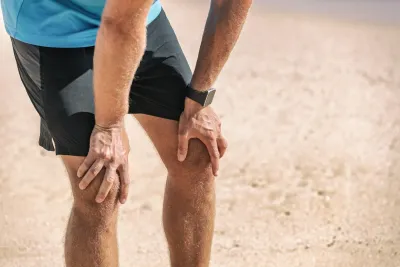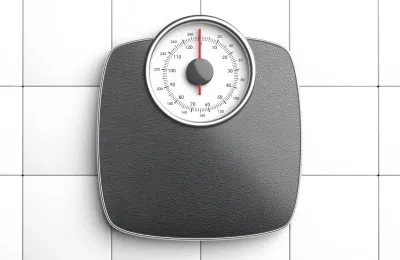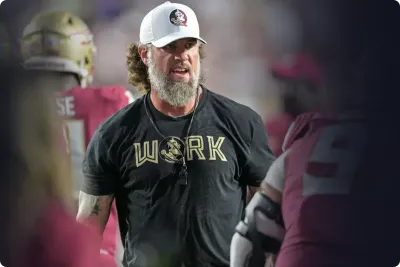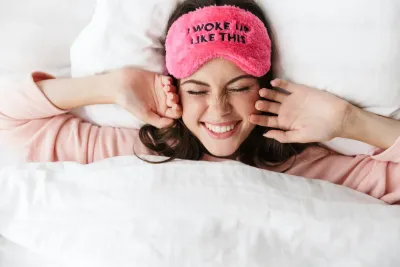Sleep Deprivation and Athletic Performance: Why Recovery Starts in Bed
Chilipad Editorial Team • Jun 17, 2025

The Rest Factor: Episode Eight with Dave Tate
You can also listen to the full podcast episode with Dave Tate.
Key Takeaways
Sleep deprivation has immediate and measurable effects on athletic performance, recovery, and decision-making.
- Even a single night of poor sleep can slow reaction time and reduce accuracy in athletes.
- Lack of sleep drains energy, lowering endurance and strength and making training feel more difficult.
- Fatigue increases injury risk by impairing coordination, judgment, and physical resilience.
- Without adequate sleep, muscle repair and recovery are less effective, slowing performance gains.
- Quality sleep supports focus, motivation, and decision-making, which are critical for consistent, peak performance.
Sleep deprivation isn't just about feeling tired—it has direct, measurable impacts on athletic performance. From slower reaction times to increased injury risk, a lack of sleep can undermine even the most rigorous training program.
Despite this, many athletes continue to underestimate the power of high-quality rest. In this week’s episode of The Rest Factor Podcast, we sit down with Dave Tate, founder and CEO of EliteFTS.
We’ll explore the hidden impacts of sleep deprivation, the critical importance of sleep optimization, and proven strategies to enhance sleep and athletic performance.
The Hidden Costs of Sleep Deprivation on Athletic Performance
Sleep deprivation can be the silent enemy sabotaging your gains. Athletes who sacrifice sleep in favor of more practice or studying are at higher risk for burnout, poor decision-making, and physical injuries.
Why Is Sleep Important for Athletes?
Deep and REM sleep stages are when your body rebuilds muscle, consolidates memory, and regulates hormones. Without sufficient sleep, these processes are disrupted, resulting in slower physical recovery and impaired cognitive performance.
As Dave Tate, founder of EliteFTS and longtime powerlifter, shared on the Rest Factor Podcast, "When you get to sleep on track, then your recovery is better, your hormones are better, your cognitive ability is better, your metabolic rate, your immunity is better, you're going to get sick less often."
How Does Lack of Sleep Affect Athletic Performance?
- Reduced accuracy: Studies show sleep-deprived college athletes see up to a 50% drop in performance.
- Slower reaction time: Sleep loss delays neuromuscular responses, a critical risk factor in sprint and team sports.
- Increased vulnerability: To illness and injury due to weakened immune response and poor tissue regeneration.
How Sleep Supports Muscle Recovery and Physical Growth
Muscle growth doesn’t happen just in the gym—it happens while you sleep. During deep sleep, your body releases growth hormone, which is essential for tissue repair and protein synthesis.
The Role of Deep Sleep in Athletic Recovery
Deep sleep (also called slow-wave sleep) is the most physically restorative part of the sleep cycle. It:
- Stimulates muscle repair and joint recovery
- Lowers cortisol (stress hormone) levels
- Supports cardiovascular health through lower heart rate and blood pressure
How Does REM Sleep Affect Muscle Recovery?
REM sleep enhances brain performance. It helps athletes make better split-second decisions and improves motor memory. Athletes who get adequate REM sleep perform better in decision-heavy sports like football, tennis, and basketball.
As Dave Tate explained on the Rest Factor Podcast, "REM sleep matters for cognitive function. I see a huge decrease if it's 30 minutes of REM... if I'm training, the ability to actually focus on task at hand when I need to focus on task at hand."
Cognitive Performance and Reaction Time: Sleep’s Mental Edge
Sleep has a direct impact on the brain’s ability to focus, react, and absorb complex movements. A well-rested brain is sharper and faster—key traits for high-stakes sports.
Case Studies in Performance:
- Stanford basketball players improved shooting accuracy by 9% with extended sleep.
- Swimmers recorded 17% faster reaction times off the block after better sleep.
- Tennis players’ serve accuracy dropped by 53% with restricted sleep.
Student Athletes and Sleep: A Hidden Epidemic
Teen athletes are especially vulnerable to chronic sleep deprivation. A staggering 70% of high school athletes sleep less than the recommended 8–10 hours.
How Much Sleep Do Teenage Athletes Need?
The CDC recommends 9–10 hours for teens. Early morning practices often disrupt their natural circadian rhythms, leading to inadequate recovery and weakened performance.
What Are the Long-Term Effects of Poor Sleep in Young Athletes?
Athletes who prioritize sleep in high school and college are less likely to suffer burnout, injury, or mental health issues later in their careers. Educating athletes early can help build lasting habits for performance longevity, removing the possibility of poor sleep.
Proven Strategies to Improve Sleep Quality for Peak Performance
Fortunately, there are simple, science-backed techniques for sleep optimization that you can implement right now.
Build a Consistent Sleep Schedule
- Sleep and wake at the same time every day, even on weekends.
- Aim for 7–9 hours of sleep (9+ for teenagers).
Optimize Your Sleep Environment
- Keep your room cool (65–68°F or 18–20°C)
- Use blackout curtains or sleep masks to block out light
- Eliminate noise with fans or white noise machines
Prioritize Sleep Hygiene Habits
- Cut screen time 1 hour before bed to preserve melatonin production
- Avoid caffeine or heavy meals late in the evening
- Dial down mental stimulation with reading or meditation
Avoid Performance-Crushing Tech Traps
- Late-night gaming and social media disrupt circadian rhythms
- Consider blue light glasses or screen dimming apps if late screen use is unavoidable
Monitor Progress the Smart Way
Sleep tracking tools like Whoop, Oura Ring, or Fitbit can be helpful—but don’t let them stress you out. Use these tools to look for patterns, not perfection.
As Ana Marie Schick, host of the Rest Factor Podcast, explained during the episode, "It's incredible... nine times out of ten, it's behavioral, it's a learned behavior. It's a pattern. And it needs to be unlearned or corrected or rectified, course corrected."
Circadian Rhythm: Your Natural Sleep-Wake Cycle
Your circadian rhythm is your internal clock, telling your body when to feel awake and when to feel tired. Disrupting this cycle—through late practices, travel, or inconsistent schedules—can wreak havoc on your performance.
How to Align Your Sleep Schedule with Your Training
- Stick to a regular bedtime and wake-up time even when traveling
- Use natural sunlight in the morning to sync your circadian rhythm
- Avoid all-nighters before competitions or exams, it’s counterproductive
High-Performance Sleep Tips for Coaches and Teams
Coaches play a critical role in shaping athlete sleep habits. Teams that prioritize rest often see fewer injuries and better overall performance.
What Are Strategies Student Athletes Can Use to Sleep Better?
- Schedule practices to allow 8+ hours of sleep
- Educate athletes about sleep's role in recovery
- Include sleep in athlete performance reviews and wellness plans
Best Sleep Routine for Athletes
- 60–90 minutes before bed, begin winding down
- Lights out at a consistent time
- Use calming rituals like journaling or breathwork to ease into sleep

Reframing Sleep as a Training Advantage
To see results, athletes need to view sleep as part of the training equation not something separate from it. Despite investing in recovery tools like cryotherapy and massage, many pros ignore the most important recovery tool of all-sleep.
No device can compensate for poor sleep hygiene. Unlike supplements or performance-enhancing drugs, sleep is natural, free, and scientifically proven to work. When athletes embrace sleep, they gain a true competitive edge. Sleep deprivation is a silent saboteur in sports performance—but it doesn’t have to be.
From cognitive sharpness to muscle recovery, deep and REM sleep are foundational pillars of success for any athlete. Now is the time to make sleep a non-negotiable part of your training program.
Whether you're a student-athlete, coach, or elite competitor, the key takeaway is this: your performance doesn’t start in the gym or on the field—it starts in bed. Prioritize sleep, and the gains will follow.
Start tonight:
- Set a consistent bedtime
- Eliminate screen time before bed
- Create a cool, dark, sleep-friendly environment
Because the athlete who recovers best—wins.
The Rest Factor: Listen to Previous Episodes
You can also catch the full episode—and browse past Rest Factor podcasts—on your favorite podcast platform with just a click.









